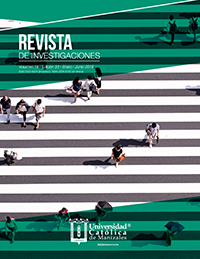LAS PRÁCTICAS PEDAGÓGICAS EN EL CAMPO DE LA EDUCACIÓN: SU CONFLUENCIA EN INVESTIGACIONES DE POSGRADO DE LA UCM - THE PEDAGOGICAL PRACTICES IN THE FIELD OF EDUCATION: ITS CONFLUENCE IN THE UCM POSTGRADUATE PROGRAMS RESEARCH
DOI:
https://doi.org/10.22383/ri.v19i33.124Palabras clave:
práctica pedagógica, pedagogía, educación, posgrados, investigaciónResumen
Objetivo: comprender las prácticas pedagógicas que caracterizan el desempeño y los discursos de los docentes, en el marco de las tesis investigativas de la Maestría en Pedagogía de la Universidad Católica de Manizales. Metodología: enfoque cualitativo, de corte hermenéutico a partir de análisis de contenido. Hallazgos: en las investigaciones abordadas predominan los siguientes rasgos. Respecto a autores el más citado es Freire, a quien siguen Flórez, Giroux y Bernstein. Las categorías predominantes son: pedagogía, educación, enseñanza, evaluación, inclusión, contexto social, aprendizaje y rol docente. Los abordajes se realizan desde las perspectivas de pedagogía crítica y pedagogía inclusiva. La metodología más utilizada es la cualitativa, con diseño metodológico etnográfico, paradigma investigativo sociocrítico y tipo de estudio biográfico narrativo. Conclusiones: la metodología cualitativa predomina en ciencias sociales pues permite análisis profundos, amplios, claros y fieles en la comprensión de los fenómenos abordados y las experiencias de quienes intervienen en las investigaciones. La pedagogía de Freire permite incorporar análisis y prácticas significativas en torno a las situaciones de opresión social y política. Los procesos educativos requieren abordajes interdisciplinarios para poder dar cuenta de una formación integral, inclusiva y compleja.
Publicado
Cómo citar
Número
Sección
Licencia
Derechos de autor 2019 Revista de Investigaciones · UCM

Esta obra está bajo una licencia internacional Creative Commons Atribución-NoComercial 4.0.
Atribución – no comercial: esta licencia permite a otros distribuir, remezclar, retocar, y crear a partir de tu obra de manera no comercial y, a pesar de que sus nuevas obras deben siempre mencionarte y mantenerse sin fines comerciales, no están obligados a licenciar sus obras derivadas bajo las mismas condiciones.











